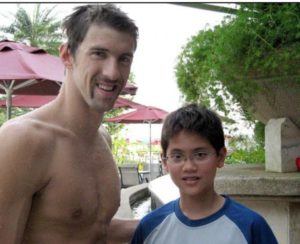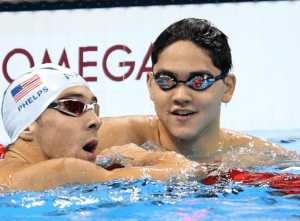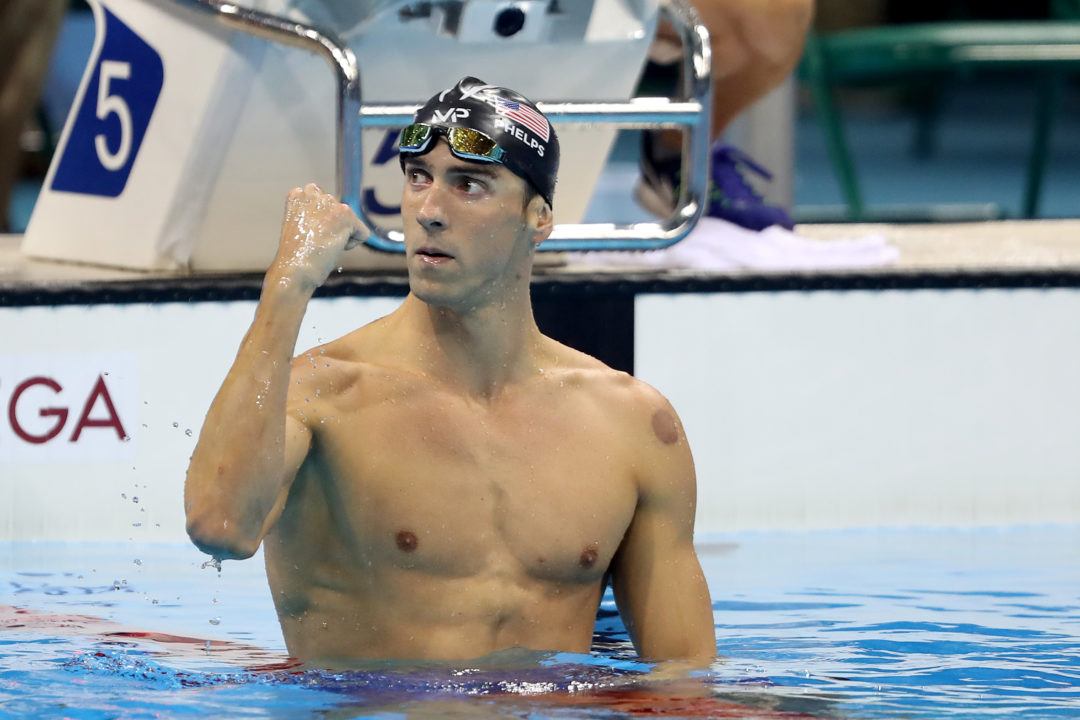To see all of our 2016 Swammy Awards presented by TYR, click here
2016 MALE SWIMMER OF THE YEAR: MICHAEL PHELPS
The first things that many of us in the swimming world think of when we hear the name Michael Phelps are his legendary 8 gold medals in Beijing, his World Record swims, or his storied 28 Olympic medals. But Phelps’ legacy is captured not only through his own accomplishments. It’s encapsulated in the individuals he has inspired to pursue greatness in the pool. This was never more apparent than it was at the 2016 Rio Olympics.

Phelps and Schooling in 2008 (photo: May Yim Schooling)
In 2008, Phelps met 13-year-old Joseph Schooling, a Singaporean butterflier who idolized him and dreamed of one day winning Olympic gold for his country. Inspired by Phelps, Schooling pursued that goal as he grew up, getting better and better until he found himself competing at the same meets as his idol. Eventually, they found themselves competing against each other in the Olympic final of the 100 fly. Schooling broke through, winning gold and breaking Phelps’ Olympic Record in the 100 fly, while Phelps was a part of a 3-way tie for silver with long-time rivals Chad Le Clos and Laszlo Cseh.
Phelps’ impact on swimming is also expressed through the attention and innovation he has brought to the sport. The audiences he’s drawn have led to sold out Arena Pro Swim Series meets and an increase in televised swim meets. In his partnership with Aqua Sphere, he’s released his own “MP” line, which was developed with the technical input and product testing of Phelps and Coach Bob Bowman. Phelps is now able to market his MP brand competitive swimwear and training gear around the world.
When he turned pro at age 16, Phelps made it clear that one of his goals was to change the sport of swimming. With a legacy that includes 23 Olympic gold medals, Phelps has certainly changed the sport for the better. In his Rio Olympic swan song, Phelps won 6 medals, making him the most-decorated Olympian of all time with 28 total medals upon his retirement at the end of the Games. He’s not only the greatest Olympic swimmer of all time in terms of awards and accolades, but also in his contributions to expanding the swimming world.
HONORABLE MENTIONS
In no particular order

Phelps, Schooling (photo: Simone Castrovillari)
- Joseph Schooling, SIN- Schooling’s early success in the year came at the 2016 NCAA Championships, where he smashed the NCAA Records in the 100 fly and 200 fly as a sophomore member of the NCAA champion Texas Longhorns. His primary focus, however, came during the long course season. While Schooling was certainly in the conversation for an Olympic medal heading into Rio, the path to gold looked tough with the likes of Phelps, Le Clos, and Cseh swimming against him. The 100 fly final was billed by Swimming Singapore as “The Race That Stops the Nation.” The Singaporeans watched as 21-year-old Schooling crushed the field, clocking the fastest textile time in history with his 50.39 and breaking the former Olympic Record set by Phelps in 2008. It was a groundbreaking moment for Schooling and Singapore. For schooling, it was the first Olympic gold medal of his career. For the Singaporeans, it was the first time they had ever seen an athlete win Olympic gold in any sport for their country. Schooling walked away from Rio as an Olympic champion with new Singaporean Records in the 100 free and 100 fly.
- Adam Peaty, GBR- At the Rio Olympics, Peaty became the first British male to win swimming Olympic gold in 28 years. After a huge World Record swim in the 100 breast and a world championship title in 2015, he was the favorite heading into the Games, but 2012 Olympic champ Cameron van der Burgh was also in the hunt. In the Olympic final, Peaty was in a league of his own. No swimmer in the field was a match for him, as he won gold by 1.5 seconds with an incredibly fast World Record time of 57.13. Later in the meet, he stepped up for Great Britain’s 400 medley relay, blasting a 56.69 for the fastest 100 breaststroke split of all time.

Plummer and Murphy (Photo: Simone Castrovillari)
- Ryan Murphy, USA- Once a highly commended age group swimmer, a 21-year-old Murphy rose to new heights in 2016. His season highlights started at the 2016 NCAA Championships, where he shattered the NCAA and American Records in the 100 back and 200 back. Months later at the U.S. Olympic Trials, he qualified to swim both backstrokes in the Rio Olympics. With the U.S. backstroke streak on the line, Murphy stepped up towin gold in both the 100 and 200 back, landing a new Olympic Record in the 100 back in the process. On the final say of competition, Murphy got one last shot at backstroke legend Aaron Piersol‘s 100 back World Record as he lined up for the backstroke leg of Team USA’s 400 medley relay. He took down the record with a 51.85 split, giving the Americans an early lead en route to relay gold.

A legend.
Swimming will not be the same without MP anymore.
We’ll never see again such a natural talent with such a mental of winner.
Congrats champion. And congrats to coach Bowman too.
MP forever.
Bobo, don’t you see a 50/50 chance of Mike coming back? I mean, why is he still working out in the pool? Maybe because just in case he changes his mind he would be more prepared to come back and keep that muscle memory.
Hi Lauren, good article. Should the headline not read Male Swimmer of the Year, leaving out the US part? Honorable mentions include two non-American greats. Thank you.
Hey Mike! I didn’t see U.S. in the title when I posted it. I did do the U.S. male swimmer of the year, and Phelps also won that. So maybe you saw that one earlier? Either way, I made sure it’s correct now. Thanks!
I think he means the headline not the title.
I see what you mean now. Fixed it!
Weird you gave hagino Asian swimmer of the year over schooling but schooling got the nod for an honorable mention and hagino didn’t
I didn’t write the Asian Swimmer of the Year article, but I’m sure whoever did that one had reasons for choosing Hagino relative to Asia. In this case, we considered swimmers who had an impact on the sport as a whole and narrowed it down to these choices.
Yeah I get he criteria is different and all no worries, just pointing it out. I also liked how for honorable mention you picked the more dominant swimmers in one event (peaty 100 breast, schooling 100 fly) over the more versatile yet less dominant swimmers (hagino, yang, le clos). I’ve always thought 1 great event>several good events
Probably because the Asian swimmer of the year award doesn’t take NCAA performances into consideration while this award does. Makes sense to me.
This is surprising